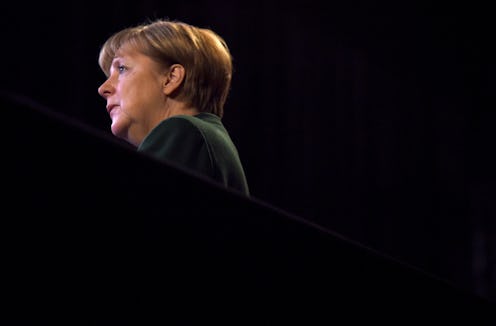News
What The Person Of The Year Says About Equality
TIME Magazine released its pick today for the 2016 Person of the Year, and in a decision that will surprise precisely no one, that person is president-elect Donald J. Trump. Considering the disrespectful attitude toward women Trump displayed during his presidential campaign, perhaps it's fitting that TIME's choice also means that the Person of the Year has only been a woman twice since 1986, as Shareblue Editor-in-Chief Melissa McEwan pointed out on Twitter.
If you're unfamiliar with the title's troubling history of gender politics, the short version is that historically, men are almost always the ones chosen. Since the creation of Person of the Year in 1927, just six women have been named on the cover: German Chancellor Angela Merkel in 2015, Filipina president Corazon Aquino in 1986, Queen Elizabeth II in 1952, "American Women" in 1975, Soong Mei-ling in 1937, and Wallis Simpson in 1936. Of those six, just four were chosen as individuals. Soong was named alongside her husband, Chinese head of state Chiang Kai-shek, and "American Women" were collectively chosen as a nod to the changing role of everyday women during the second wave feminist movement.
Last year, Merkel became the first woman to receive the title since Aquino in 1986. In the meantime, women often made the shortlist and were chosen as members of groups like the "Whistleblowers" in 2002 or "Ebola Fighters" in 2014 — but that's still a 29 year gap between women who didn't have to share the title. Perhaps most tellingly, it wasn't until 1999 that the official title was changed from "Man of the Year" to "Person of the Year." To put that in perspective, Mulan was already on VHS by the time the title was change to reflect the fact that the most influential person of the year wouldn't necessarily be a man.
On one hand, Trump was the inevitable choice for 2016 Person of the Year. As Nancy Gibbs explains in the article announcing the decision, his election to office upended the political establishment that refused to take him seriously. "Out of this reckoning, Trump is poised to preside, for better or worse," she writes.
The decision to award him the title will undoubtedly be discussed to death, but it's a symptom of a larger problem with how women are viewed even in 2016. Each year, TIME is adamant that the Person of the Year isn't necessarily an honor; Adolf Hitler and Ayatullah Khomeini have both been chosen alongside figures like Barack Obama and the Apollo 8 astronauts. As former editor Walter Isaacson wrote in 1998, the Person of the Year is someone who "most affected the news and our lives, for good or ill, and embodied what was important about the year, for better or for worse." Essentially, the decision is based on influence rather than moral fiber.
Perhaps one reason women are chosen so infrequently isn't just because of the ever-present glass ceiling. Even in 2016, they're seen as incapable of the same kind of complexity as men, especially when in regards to morality. Throughout history, women have been seen as inherently pure, and by extension, they're held to higher ethical standards than men — which means they have further to fall. This manifests in a number of ways. Many believe that the responsibility is on women, for instance, to ward off male sexual advances, and in pop culture, female villains rarely have motivations as complex as their male counterparts. During Clinton's campaign, she was heavily criticized for using private emails as Secretary of State, while the sexual assault allegations directed at Trump, which he has denied, were largely shrugged off by his supporters.
In the past, the women who have been chosen as Person of the Year have certainly been influential, but none are controversial in the way of picks like Khomeini or Trump. Simpson was an American socialite; Aquino was a beloved Filipina politician. When Merkel was chosen last year, she hadn't yet called for the a burqa ban in Germany. Margaret Thatcher, whose time as British Prime Minister proved to be divisive, never received the title. If the Person of the Year is ever going to include more women, the pool can't just include the best of us. True equality is about accepting that, no matter our gender, we're all people — the good, the bad, and the morally ambiguous.
